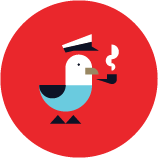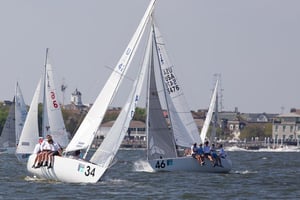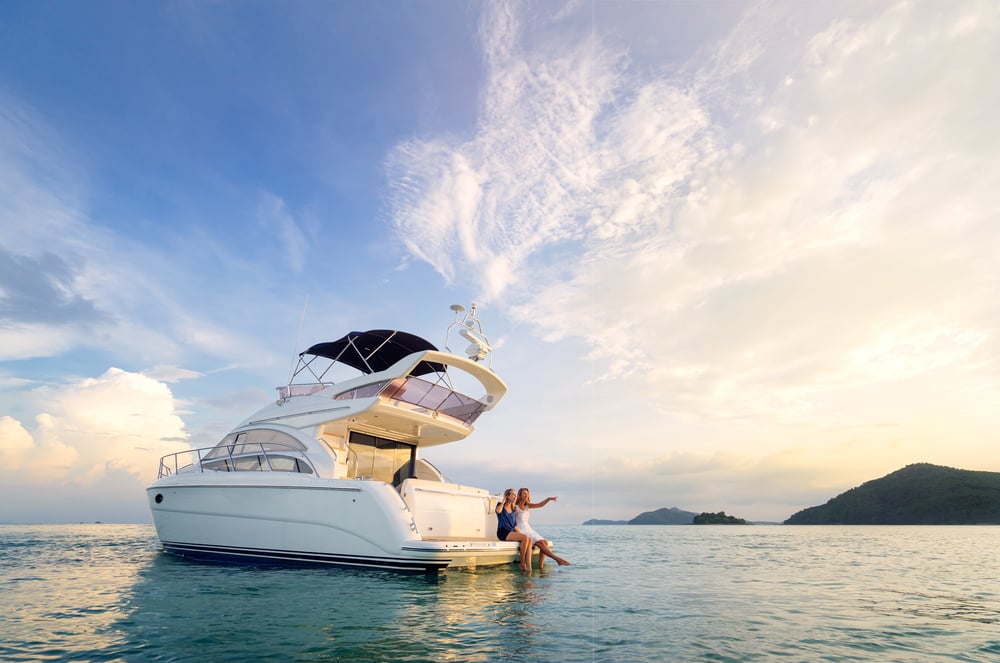If you've registered your boat online, you're already with the program – just make sure you document your route to the race, and tag the...
Injured, Immobilized, Adrift: The Unrelenting Spirit of Abhilash Tomy
Post by Janelle Cox - Published on 11/09/21 13:30 PM

A reasonable person would label this day, at the very least, a bad one. But, for Abhilash, it was a day of relief, although unwelcome. With nothing to do and the pressure of racing off, he was already planning for the next competition.
“This is a race for madmen.”Who is Abhilash Tomy?
Abhilash began his sailing career in 1996 at age 17. After joining India’s naval academy, although he didn’t have any prior experience, he was eager to join the sailing team.
“When I tried it, the senior cadets realized quickly I didn’t know what I was doing, so they rejected me,” Abhilash said. “The following year, I took out a lot of books from the library to try to learn as much about sailing as I could. When I tried again, they thought I knew something.”
While Abhilash sailed mostly dinghies and lasers during his initial years of active duty, later becoming a maritime reconnaissance pilot, in 2013, he became the first Indian to complete a solo, non-stop circumnavigation of the world under sail. Abhilash also represented India in several other international sailing events, including the 2011 Cape Town to Rio Race, the 2014 Spanish Copa del Rey race, and two successive Korea Cups. In addition, Tomy was a special invitee and the only Asian entrant in the 2018 edition of the 2018 Golden Globe Race.

The History of the Golden Globe Race
In August 1966, British yachtsman Francis Chichester set out from England to complete a solo circumnavigation, which he did in 226 days, setting a record for the fastest voyage around the world in a small boat. Thanks to exclusive coverage provided by The Sunday Times newspaper, his world tour attracted great interest and a large following. As a result, Francis became a British hero, inspiring many, including Queen Elizabeth II, who knighted him after returning to England.
The first Golden Globe Race itself, which occurred in 1968-1969, has a torrid history. The Sunday Times announced the race offering a trophy and £5000 for the fastest time. Nine men started the race, but only one, Robin Knox-Johnston, finished. Robin, whose boat, a 9.75m traditional ketch rigged double-ended yacht named Suhaili at the start, was considered the unlikely winner, but the rest of his competitors either sank, retired, and one, Donald Crowhurst, committed suicide.
Remaining authentic to the tournament’s origins, today, the Golden Globe Race requires all entrants to use the same or similar equipment and technology that Robin Knox-Johnston carried on board his winning yacht Suhaili. There are also yacht design limitations meaning all vessels must adhere to the following specifications:
-
Of fibre-reinforced plastic construction.
-
Designed before 1988 and have a minimum series of 20 yachts built from one mold.
-
Have a hull length of between 32ft and 36ft. Bowsprits, wind vanes and outboard rudders, boomkins, push pits, and pulpits are not measured.
-
Have full-length keels with rudders attached to the trailing edge.
-
A minimum design displacement is 6,200kg.
-
A Suhaili replica was given a few exemptions–it could be a new construction, of wood or steel or fibreglass.
Preparing for the 2018 Golden Globe Race
Since his first non-stop circumnavigation in 2013, Abhilash was thirsty for more.
“I knew the sea I was going to encounter,” Abhilash explained. “My focus was preparing the boat and training myself in certain aspects of the race. When you’re sailing alone at sea, you need a diverse set of skills. You need to know everything from electrical engineering, carpentry and fiberglass work, how to cook and nourish yourself, first-aid, and weather forecasting.”
What makes the Golden Globe Race so different from other solo circumnavigation competitions is it forbids competitors from using the latest technologies. While the boats are tracked electronically for safety, race participants must sail like it’s 1968. No modern electronics are allowed, which means the race prohibits GPS, chart plotters, electronic wind instruments, electric autopilots, satellite phones, digital cameras, computers, pocket calculators, electronic clocks or watches, water bottles, etc. Instead, they navigate with sextants on paper charts, listen to cassette tapes, cook with kerosene, and write their logs by hand or typewriter.

“I spent quite a lot of time learning how to navigate with a sextant,” Abhilash said. “You have to do certain calculations, and they can’t be wrong because there is no way to check for errors. Then, once you do those calculations, you plot it on a chart and derive your position. It’s a complicated procedure, and you need to be accurate every time.”
Simultaneously, while brushing up on his technical skills, Abhilash built his racing vessel, Thuriya, a replica of Sir Robin Knox-Johnston’s original winner, Suhaili. The boat needed to be fitted and ergonomically designed to Abhilash’s unique specifications as efficiency is especially important for a race of this magnitude.
“I didn’t do well in the sponsorship department, so I took on a lot of debt for this race.”
Once Abhilash completed his technical schooling and the boat building, it was time to get out on the water. While training for a marathon, a runner would only increase their mileage but never run an entire 26 miles as it’s a massive stress on the body. Abhilash took a similar approach with the race imminent, sailing from the Netherlands to France as it’s all he had time for. His second attempt to sail the world would be the Golden Globe Race of 2018.

The Wait for Search and Rescue
On September 21st, 82 days into the competition, race organizers had sent a message to Abhilash and two of his fellow competitors, Gregor McGuckin and Mark Skats.
“Before the storm hit, we received a warning from the race organizers that it was heading our way,” Abhilash said. “We didn’t know it would be that bad.”
However, as Abhilash, Gregor, and Mark braved the storm, it became increasingly clear that it would be a fight for their lives. While Mark could weather it and eventually finish the race, this would be the end of the competition for Abhilash and Gregor. Gregor, who was behind Abhilash, had a knockdown and lost both his masts. Abhilash’s fate was similar.
“During the first knockdown, my mizzen boom broke. I was holding onto the mizzenmast in the second, but I got separated from the boat hull. The boat flipped upside down, and I was pressed underwater,” Abhilash explained. “When the boat straightened, I was on top of the mizzenmast. From there, I fell about nine meters onto the boom and hit my back.”
About 30 minutes after his fall, Abhilash realized something was wrong with his back as he couldn’t walk nor stand. That’s when he sent a distress message– “Rolled. Dismasted. Severe back injury. Cannot get up.”–which triggered the search and rescue operation. While Abhilash waited three and a half days, confined to his bunk bed, injured, immobilized, and adrift, all he had to survive on were a few cans of iced tea.
“I would have the iced tea then vomit. Then, I’d drink some more and vomit again. Vomiting was important because it stopped the incessant hiccups and helped me sleep.”

Meanwhile, one Indian Navy warship, one Australian navy ship, a French fisheries patrol boat, and his competitor Gregor rushed to Abhilash’s location. (One Indian Navy P8I Orion and a Royal Australian Air Force P8 too were rushed to look for me.) With no way to access any food, water, the radio he was using to contact the race organizers, or the satellite phone he had on board for an emergency of this nature, Abhilash knew panicking wasn’t an option. So instead, while he waited for rescue, Abhilash turned his focus to the next Golden Globe Race.
“If you panic, then the battle is over,” Abhilash explained. “So, I was consciously making sure that I didn’t have any thoughts that would create panic. To keep my mind healthy, I was constantly chanting to focus my energy on my peace. At that time, I didn’t know how long it would take for rescue, so I had to keep myself alive.”
On September 24th, 2018, help finally arrived. Abhilash was first transported to Amsterdam Island, a primarily remote French territory in the southern Indian Ocean. Because of the primitive medical facilities available, his initial X-Ray didn’t show any fractures in his spine. It wasn’t until the Indian Navy arrived and they transferred him to a hospital in India that an MRI later revealed the extent of his injuries. Eighteen days after his injury, he underwent major back surgery.
“The doctors fused five vertebrae with the help of two titanium rods with eights screws,” Abhilash explained. “I was in the hospital for two weeks and given a two-month recovery period. After the two months, I re-joined active duty in the Navy and was placed in a low medical category for another six months until I was well enough to sail and fly again.”

The Road to the 2022 Golden Globe Race
Currently, Abhilash is preparing for his second Golden Globe Race attempt, which will take place in September of 2022. This time, he’s hoping to do so with more sponsors under his belt.
“In 2018, when I was looking for sponsors, everyone told me it was impossible because no one follows sailing in India. But, when the race ended, the numbers told a different story,” Abhilash explained. “The second highest online engagement rate for the race came from India. The highest spike happened in September after the accident. So, they were wrong to say nobody follows because even if you don’t understand sailing, people connect with these human stories.”
 Despite all that happened, Abhilash refuses to label his first Golden Globe Race as a bad experience. On the contrary, the money it took to prepare, his accident, and his recovery were valuable in all he learned through his participation in the tournament.
Despite all that happened, Abhilash refuses to label his first Golden Globe Race as a bad experience. On the contrary, the money it took to prepare, his accident, and his recovery were valuable in all he learned through his participation in the tournament.
“I’d say it’s human to color your experiences as good or bad, but I try not to,” Abhilash explained. “Yes, I had an experience, but I won’t say it was a bad experience. There’s a little bit of madness that pushes me to do this.”
A rational person would be hesitant to step foot on a sailboat again after an accident like his, but sailing is a complete sense of freedom for Abhilash. It’s a freedom he’s not willing to part from regardless of what anyone has to say, which is why he’s ready to put his life, and at the very least, his body on the line again. At least this time, if another bad storm were to cross his path, Abhilash has a back of steel to accompany his unrelenting spirit.
“I reach a stage where I can think clearly. I can do what I want to do, and I can be what I want to be without people telling me anything,” Abhilash said. “For the first couple of weeks, you’re still cutting your umbilical ties to the land, but eventually, you experience this immense freedom that only comes when you’re at sea.”

Want to see more of Abhilash Tomy and support him in the 2022 Golden Globe Race? Donate here: https://dkwa.co/cdrTomy! Follow Abhilash on Instagram and Twitter.
Quotes have been edited for clarity. Stay up to date with our First Mates series and more on our blog and join the conversation on Facebook, Twitter, and Instagram.
What’s your story? We’re on a mission to highlight the boating world’s entrepreneurs, small businesses, community organizations, and solo initiatives – drop us a line here to get the ball rolling.




